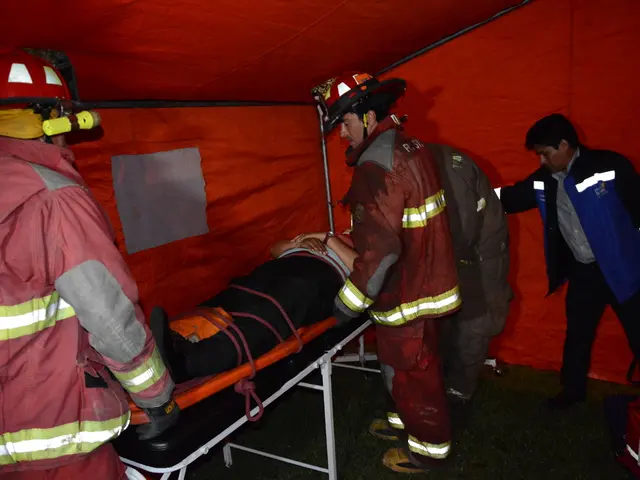MRSA spread: Methods, measures against it, and further insights
Methicillin-resistant Staphylococcus aureus (MRSA) colonization indicates the presence of antibiotic-resistant bacteria on or within the body without causing noticeable symptoms. Despite the absence of signs, this condition can pose a significant concern for healthcare professionals due to the possibility of unintentional transmission and subsequent infection, particularly in healthcare settings.
MRSA bacteria are commonly found in moist locations such as the nose, throat, groin, armpits, skin folds, and perineal area. While it does not result in symptoms, MRSA colonization can lead to potentially harmful infections, especially in individuals with weakened immune systems or wounds.
Healthcare professionals might screen individuals for MRSA bacteria, particularly those planning for surgery, by swabbing common infection sites. If detection occurs, measures may be taken, such as the use of nasal creams or sprays, body wash, and shampoo, to lower the bacteria count for a period of 5 to 10 days.
Preventative measures against MRSA include regular hand washing, keeping wounds clean, avoiding the sharing of personal items like towels and clothing, and maintaining cleanliness in the home and healthcare settings.
MRSA infections can occur at skin sites with cuts or abrasions, characteristically manifesting as pain, redness, pus, swelling, and warmth. Remaining vigilant in maintaining good hygiene practices can help reduce the likelihood of MRSA colonization and subsequent infections.
While some infections might clear on their own, MRSA colonization usually requires proactive measures such as the use of topical antibiotics to eliminate the bacteria from the body.
[*Footnote links can be added if desired for reader reference]
- In the realm of medicine, MRSA, a superbug known for its resistance to antibiotics, can be a silent adversary, even when it doesn't cause visible symptoms, posing serious concerns due to its infectious nature.
- The chronic nature of some medical-conditions, especially autoimmune disorders, weakened immune systems, and certain chronic diseases, can increase an individual's susceptibility to harmful infections caused by MRSA.
- The battle against cancer often involves therapeutic interventions, but even simple respiratory conditions can become more complex when they are complicated by MRSA bacterial infections.
- Digestive health issues and eye-health complications, though seemingly unrelated, may experience further complications due to MRSA, highlighting the wide-ranging impact of this superbug.
- Regular checkups and hearing tests can reveal early signs of potential issues, while maintaining awareness and practicing proper hygiene can help prevent MRSA infections, even in the delicate realm of hearing.
- Maintaining good health and wellness relies on a multi-facet approach, not limited to fitness and exercise, mental health management, and nutrition, which all play crucial roles in bolstering the body's defense mechanisms against MRSA.
- Proactive skin-care practices like cleansing and moisturizing can help prevent harmful bacteria like MRSA from finding entry points in the body, offering a simple yet effective line of defense.
- Skin conditions like eczema or acne can provide perfect breeding grounds for MRSA, emphasizing the importance of proper skin-care regimens and hygiene practices.
- In the event of detection, therapies and treatments such as topical antibiotics, oral medications, or in severe cases, hospitalization, might be necessary to combat an MRSA infection effectively.
- Ultimately, a combination of preventative measures, vigilance, proper hygiene, and proactive intervention is essential in managing the risk of MRSA colonization and subsequent infections.








